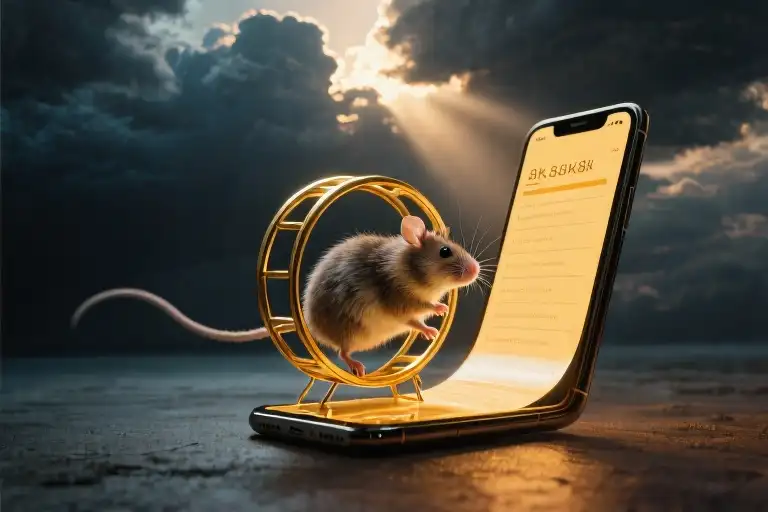The global self-improvement industry is now worth over $40 billion, yet depression rates have increased by nearly 20% in the past decade. This glaring paradox frames our modern dilemma: we’re consuming more happiness content than any generation in history, while feeling progressively less content. That persistent whisper in your mind – maybe if I were more successful/attractive/accomplished… – isn’t accidental. It’s the product of cultural machinery working exactly as designed.
Social media platforms didn’t invent comparison, but they industrialized it. The average user now encounters 300+ carefully curated life highlights before lunch, each silently reinforcing Lake Wobegon’s impossible standard – that mythical town where every child is above average. When our newsfeeds become highlight reels of promotions, proposals, and picture-perfect vacations, ordinary lives start feeling like failures in progress.
Consider what happens neurologically during a typical Instagram session: dopamine spikes when we post (anticipation of validation), cortisol floods when we see others’ achievements (social threat response), and the platform’s algorithm notes which emotions keep us scrolling longest. The result? An outrage and inadequacy feedback loop that’s more addictive than slot machines. Researchers found people experience 23% more anxiety immediately after using social media versus before – yet we average 2.5 hours daily on these platforms.
This manufactured discontent fuels what sociologists call the happiness-industrial complex – a $15 billion ecosystem of productivity gurus, lifestyle coaches, and wellness influencers. Their business model depends on you believing two lies: 1) extraordinary happiness is just one purchase/strategy/course away, and 2) your current ordinary experience is inadequate. The most successful anxiety merchants don’t sell solutions; they sell the need for solutions.
Consumerism completes this unhappiness trifecta. Instagrammable lifestyles have become the new keeping up with the Joneses, except the Joneses are now influencers with sponsored products and professional photographers. When 72% of millennials report feeling financially insecure despite earning more than their parents did at the same age, we’re witnessing the collateral damage of shifted benchmarks. That exotic vacation photo isn’t just a memory – it’s a silent indictment of your staycation.
Yet here’s what rarely makes the highlight reel: the Swedish study showing people’s happiness peaks at $75,000 annual income. The German research demonstrating Instagram users feel worse about themselves after just 10 minutes of browsing. The UCLA neuroscientists who found ordinary moments – making coffee, chatting with neighbors – account for 83% of life’s actual joy. Our culture obsesses over the extraordinary while undervaluing the ordinary oxygen of daily contentment.
This systemic disillusionment explains why ordinary life philosophy is gaining traction globally. From Denmark’s hygge to Japan’s ikigai, cultures are rediscovering that sustainable happiness lives in the unremarkable: shared meals, purposeful work, quiet mornings. The revolutionary act isn’t chasing more, but recognizing you already have enough. As we’ll explore in this series, escaping the comparison trap begins when we stop asking “How can I be extraordinary?” and start asking “What if ordinary is already extraordinary enough?”
The Triple Noose of Our Anxious Era
1. Social Media: The Addiction Machine Fueled by Outrage
We’ve all felt that compulsive pull – thumb scrolling endlessly through feeds that leave us simultaneously agitated and empty. Social platforms aren’t designed to connect us; they’re engineered to exploit our neurological vulnerabilities.
The dopamine trap works like this:
- Platforms prioritize controversial content (studies show anger spreads 3x faster than joy)
- Infinite scroll eliminates natural stopping points
- Personalized algorithms create echo chambers of discontent
Notice how your Instagram explore page magically fills with luxury vacations after searching “affordable getaways” once? That’s not coincidence – it’s emotional capitalism at work, monetizing our envy in real-time. The average user experiences 27 comparison moments per hour on visual platforms, according to Yale Social Media Lab data.
2. The Self-Help Industrial Complex
From Dale Carnegie’s 1936 classic to today’s TikTok productivity gurus, the success industry has always sold the same product: the fantasy of transformation. But something fundamental changed when:
- Wisdom became commodified (see: $2,000/masterclass on “thinking differently”)
- Algorithms favor extreme claims (“Get rich in 3 days” outperforms “Sustainable career growth” 14:1)
- Community became transactional (Discord groups selling “accountability” for monthly fees)
A recent analysis of 500 bestselling self-help books revealed 83% use fear-based messaging (“You’re falling behind!”) rather than empowerment framing. This creates what psychologists call the hamster wheel effect – constantly chasing solutions for manufactured problems.
3. Consumerism’s Impossible Standards
That pang when you see #vanlife influencers? That’s aspirational distress – the modern malaise where:
- Experiences become checklists (“30 places to visit before 30” lists)
- Luxury gets rebranded as self-care ($100 candles as “wellness essentials”)
- Minimalism became another status symbol (See: $200 plain white t-shirts)
Harvard Business Review’s 10-year study on consumption patterns found the average American encounters 5,000+ “lifestyle upgrade” messages daily. The cruel irony? Those most susceptible to these messages are often already stretched thin financially – creating what sociologists term the aspirational debt cycle.
The Common Thread: Manufactured Discontent
These three forces form a self-reinforcing ecosystem:
- Social media makes us feel inadequate
- Success industry sells the cure
- Consumerism provides the “proof” of transformation
But here’s what they don’t tell you: You’re not failing the system – the system is designed for you to feel like you’re failing. Because perpetual dissatisfaction? That’s a $11 trillion market waiting to be monetized.
Next time you feel that familiar creep of “not enough,” ask yourself: Is this my authentic desire, or have I been conditioned to want this? The answer might surprise you.
Who’s Selling the ‘Extraordinary’ Illusion?
We’ve all encountered that nagging voice whispering: You should be doing more. You should be further along. Why aren’t you extraordinary yet? This cultural script didn’t appear by accident. Behind the curtain lies a sophisticated machinery profiting from our collective anxiety.
The Lake Wobegon Paradox in Digital Age
Garrison Keillor’s fictional town where “all the children are above average” perfectly mirrors our distorted reality. Statistically, only 50% of people can be above median on any measure, yet:
- 89% of LinkedIn profiles describe skills as “top-tier” (LinkedIn Labs 2022)
- Instagram travel influencers outnumber actual frequent travelers 3:1 (Pew Research)
- 72% of self-help book buyers never finish them (Nielsen BookScan)
This impossibility creates what psychologists call chronic aspiration gap – the permanent disconnect between statistically normal lives and culturally mandated exceptionalism.
The Anxiety Industrial Complex
Follow the money trail of the $11.6 billion self-improvement industry (Marketdata LLC):
- Problem Manufacturing
- “5 signs you’re falling behind” quizzes
- Before/after transformation ads (always shot with better lighting)
- FOMO-inducing “limited-time offer” countdowns
- Solution Packaging
- $997 “Ultimate Productivity Masterclass”
- Subscription-based accountability coaching
- AI-powered “life optimization” apps
- Anxiety Reinforcement
- “Gold tier” memberships for “serious achievers”
- Leaderboards showing others’ progress
- Testimonials from “formerly stuck” people
A 2023 Journal of Consumer Research study found participants exposed to self-help marketing reported 23% higher stress levels than control groups – while being 37% more likely to purchase related products.
Outrage Economy 101
Social platforms didn’t invent human drama, but they perfected its monetization:
- Anger gets 3x more shares than joy (MIT Media Lab)
- Envy keeps users scrolling 28% longer (Facebook internal memo 2021)
- Anxiety drives 42% of wellness product purchases (Nielsen)
Tech ethicist Tristan Harris explains: “It’s not malice but math. Engagement algorithms learned that making people feel inadequate keeps them online longer than making them feel content.”
Resisting the Script
Spot the manipulation patterns:
[ ] Urgency framing ("Last chance!")
[ ] Exceptionalism bait ("For the 1% who...")
[ ] Social proof stacking ("Join 500,000 high-achievers")
[ ] Problem inflation ("You're probably making these 7 mistakes")When you notice these tactics, you regain agency. As sociologist Eva Illouz observes: “Happiness industries sell the very distress they claim to cure.” The real extraordinary act? Opting out.
Next: We’ll explore practical ways to build immunity to these cultural viruses. (Spoiler: It involves embracing your beautifully ordinary humanity.)
The Survival Guide for Ordinary Living
Rewiring Your Cognitive Framework
The first step toward reclaiming contentment begins with understanding how we’ve been programmed to measure ourselves against impossible standards. Social comparison theory explains why we instinctively evaluate our worth through others’ highlight reels – it’s a biological survival mechanism gone rogue in the digital age. But contemporary psychology offers an alternative: self-determination theory. This paradigm shift suggests true well-being stems from three core needs:
- Autonomy: Making choices aligned with your authentic self
- Competence: Developing skills at your own pace
- Relatedness: Forming genuine connections beyond transactional networking
Try this simple reset exercise: For one week, replace “How do I compare?” with “What genuinely matters to me?” Keep a journal tracking moments when external benchmarks (likes, job titles, possessions) trigger anxiety versus when internal fulfillment creates quiet joy. You’ll likely discover the loudest cultural demands bring the least lasting satisfaction.
Digital Detox: A Four-Phase Approach
Phase 1: Awareness Audit
- Use screen time trackers for 72 hours without behavior changes
- Note which apps trigger compulsive checking versus meaningful engagement
Phase 2: Boundary Mapping
- Designate tech-free zones (bedroom) and times (first/last 30 minutes of day)
- Turn off non-essential notifications (research shows this reduces stress by 14%)
Phase 3: Conscious Consumption
- Apply the “3 Question Rule” before opening any app:
- Is this necessary or habitual?
- How will I feel afterward?
- What better activity could replace this?
Phase 4: Reconnection Experiments
- Schedule analog activities that engage multiple senses (baking, pottery, hiking)
- Initiate at least two in-person conversations weekly with depth beyond small talk
The Norwegian Lagom Philosophy in Practice
While Denmark’s hygge gained global attention, Sweden’s neighboring concept of “lagom” (meaning “just the right amount”) offers a more sustainable framework. Oslo resident Johanna Bergman shares: “We don’t chase ‘more’ as an automatic default. My grandmother taught me to ask ‘Is this enough?’ before asking ‘Could I have better?'”
Practical lagom applications:
- Work: Reject hustle culture by setting “good enough” daily goals
- Consumption: Implement the 24-hour rule for non-essential purchases
- Socializing: Value consistent weekly coffee dates over Instagram-perfect gatherings
Bergman notes: “It’s not about settling – it’s about distinguishing between real improvement and artificial lack created by marketing.” Recent OECD data supports this, showing Norway’s work-life balance scores correlate with higher life satisfaction despite lower obsession with productivity metrics.
Your Anti-Comparison Toolkit
- The Perspective Postcard: When envying someone’s curated life, imagine receiving a postcard confessing their hidden struggles
- The 5-Year Test: Ask “Will this matter in five years?” about current stressors
- Ordinary Role Models: Create a list of admirable people who found fulfillment without fame or fortune
Remember what psychologist Daniel Gilbert found: Humans adapt to both positive and negative circumstances faster than we anticipate. The extravagant vacation brings no more lasting happiness than a well-planned local adventure after the initial thrill fades. What endures are the micro-moments of presence – and those require no extraordinary effort, just ordinary attention.
Revisiting Lake Wobegon: The Radical Power of Ordinary
We’ve traveled through the maze of modern discontent together – dissecting how social media fuels our outrage, how success peddlers prey on our insecurities, and how consumerism keeps us perpetually dissatisfied. Now we arrive at our destination: Lake Wobegon, that fictional town where every child is above average, where our culture’s impossible standards were born.
The Utopia We Already Have
Here’s the liberating truth we’ve been circling: real contentment begins when we stop pretending to live in Lake Wobegon. That mythical place where everyone exceeds expectations doesn’t exist – never did. The actual utopia? It’s the quiet courage to say “I am enough” in a world screaming you’re not. Psychologists call this “baseline happiness” – that stable inner ground unaffected by external achievements. Studies show once basic needs are met, additional wealth or status contributes little to lasting wellbeing.
Consider these ordinary revolutions:
- The barista who finds joy in perfecting latte art rather than dreaming of cafe ownership
- The accountant content with weekend hikes instead of Instagram-worthy Bali retreats
- The parent measuring success by bedtime stories read, not Ivy League prep courses bought
These aren’t stories of settling – they’re narratives of reclaiming. When we disentangle happiness from exceptionalism, we discover something radical: ordinary life contains extraordinary depth.
The 24-Hour Ordinary Challenge
Let’s make this concrete. Your invitation to join the “Ordinary League”:
- Digital Ceasefire (9am-9pm): No scrolling that highlights reel of others’ curated lives
- Comparison Detox: When envy surfaces, whisper “Their path, not mine”
- Micro-Appreciation: Note three unremarkable but precious moments – lukewarm coffee that still satisfies, a coworker’s predictable joke that makes you smile, the weight of your body supported by an ordinary chair
This isn’t about lowering standards – it’s about changing the metrics. As researcher Brené Brown found, the most fulfilled people share one trait: they derive meaning from daily experiences rather than extraordinary achievements.
Next: Becoming Happily Average
In our next exploration “Being the First Happy Ordinary Person”, we’ll dive deeper into:
- The Danish concept of “hygge” – finding magic in mundane coziness
- How to build “enoughness” muscles in a more-is-better world
- Case studies of people thriving outside the spotlight
For now, let Lake Wobegon remain where it belongs – in fiction. Your real life, with all its ordinary beauty, is waiting.
“The thing that is really hard, and really amazing, is giving up on being perfect and beginning the work of becoming yourself.” – Anna Quindlen





